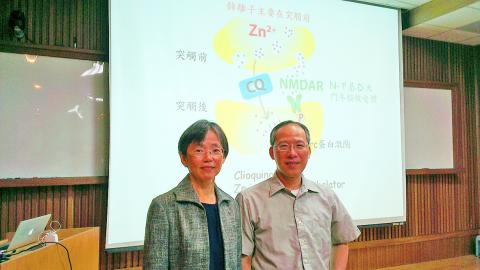An Academia Sinica study linking low zinc concentrations often detected in autistic people to genetic defects in two proteins suggests that autism-like behavior could be greatly ameliorated by boosting the transmission of zinc to the brain with the help of an antibiotic.
Academia Sinica research fellow and project leader Hsueh Yi-ping (薛一蘋) said her team obtained the results after performing an experiment on mice, which she said are sociable animals and therefore perfect test subjects.
Scientists compared the interactions of test mice by placing the subjects in a box, mice that had been unchanged, mice with their Tbr1 and Shank2 proteins “knocked off” and another “stranger” mouse.

Photo: Tang Chia-ling, Taipei Times
They found that unchanged mice engaged in high-level interaction with the “stranger” mouse, while mice with Tbr1 and Shank2 deficiencies interacted very little.
Hsueh’s team had previously determined that Tbr1 is a contributing factor of autism, while a team led by South Korean scientist and project coleader Eunjoon Kim discovered that Shank2 is also implicated in the condition.
Both deficiencies hamper the transmission of zinc ions to the NMDAR (N-methyl-D-aspartate) receptor, impairing function.
About 30 percent of children with autism suffer from zinc deficiency.
The researchers used clioquinol, an antibiotic used to increase zinc absorption, on the mice displaying autistic behavior and found that they began behaving in a way almost identical to that of the unchanged mice as both the level of activity and interaction with the “stranger” mouse increased, Hsueh said.
Clioquinol helps to move zinc from a presynaptic terminal to postsynaptic sites in the brain, where it undergoes a chain of chemical reactions before being picked up by the NMDAR receptor. The research teams concluded that the improvements displayed by the autistic mice were achieved with the presence of zinc.
Hsueh said that previous projects had determined that autism is linked to zinc deficiency, but the research undertaken by Academia Sinica and the South Korean researchers is the first to provide a scientific explanation for the phenomenon by establishing that the social inhibitions caused by autism can be changed by revitalizing the NMDAR receptor.
Hsueh said the results from the experiment conducted on mice can be extrapolated to humans, with a higher than 90 percent relevance between the two species.
She said that as clioquinol is a prescription drug permitted in Taiwan, her team hopes psychiatrists will prescribe the drug to suitable patients.
Citing US research, she said that autism is becoming more prevalent, with the chance of children developing the condition rising from one in every 88 children to one in every 68.
The scientific community believes that there are at least 900 genes in humans that could lead to autism, and that it is likely that the therapy can be used to target other genetic defects to improve autistic conditions, she said.
Hsueh recommends that people with autism who are diagnosed with zinc deficiency caused by the underexpression of the NMDAR receptor to increase their zinc intake by eating food high in zinc, such as oysters. She added that meat, which is rich in protein, helps boost zinc absorption.

Taiwanese can file complaints with the Tourism Administration to report travel agencies if their activities caused termination of a person’s citizenship, Mainland Affairs Council Minister Chiu Chui-cheng (邱垂正) said yesterday, after a podcaster highlighted a case in which a person’s citizenship was canceled for receiving a single-use Chinese passport to enter Russia. The council is aware of incidents in which people who signed up through Chinese travel agencies for tours of Russia were told they could obtain Russian visas and fast-track border clearance, Chiu told reporters on the sidelines of an event in Taipei. However, the travel agencies actually applied

Japanese footwear brand Onitsuka Tiger today issued a public apology and said it has suspended an employee amid allegations that the staff member discriminated against a Vietnamese customer at its Taipei 101 store. Posting on the social media platform Threads yesterday, a user said that an employee at the store said that “those shoes are very expensive” when her friend, who is a migrant worker from Vietnam, asked for assistance. The employee then ignored her until she asked again, to which she replied: "We don't have a size 37." The post had amassed nearly 26,000 likes and 916 comments as of this

New measures aimed at making Taiwan more attractive to foreign professionals came into effect this month, the National Development Council said yesterday. Among the changes, international students at Taiwanese universities would be able to work in Taiwan without a work permit in the two years after they graduate, explainer materials provided by the council said. In addition, foreign nationals who graduated from one of the world’s top 200 universities within the past five years can also apply for a two-year open work permit. Previously, those graduates would have needed to apply for a work permit using point-based criteria or have a Taiwanese company

The Shilin District Prosecutors’ Office yesterday indicted two Taiwanese and issued a wanted notice for Pete Liu (劉作虎), founder of Shenzhen-based smartphone manufacturer OnePlus Technology Co (萬普拉斯科技), for allegedly contravening the Act Governing Relations Between the People of the Taiwan Area and the Mainland Area (臺灣地區與大陸地區人民關係條例) by poaching 70 engineers in Taiwan. Liu allegedly traveled to Taiwan at the end of 2014 and met with a Taiwanese man surnamed Lin (林) to discuss establishing a mobile software research and development (R&D) team in Taiwan, prosecutors said. Without approval from the government, Lin, following Liu’s instructions, recruited more than 70 software